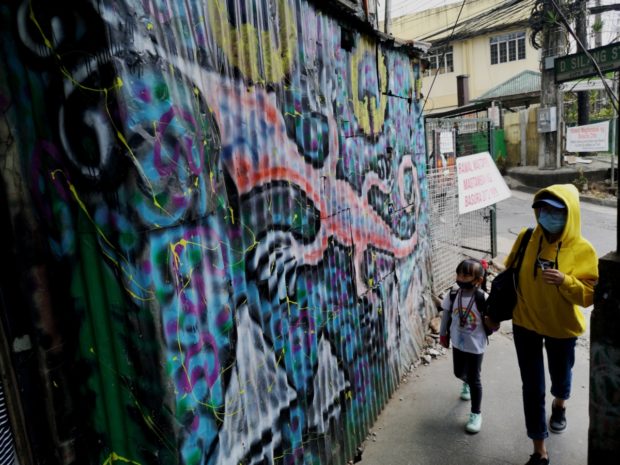House OKs on final reading bill seeking to develop creative industries

ART HOUSE: Baguio has been home to some of the best and many unrecognized artists in the country. Some of them now need help after the COVID-19 lockdown put their livelihood to sleep. (File photo by EV ESPIRITU / Inquirer Northern Luzon)
MANILA, Philippines — The House of Representatives has passed on third and final reading a bill seeking to create a Philippine Creative Industry Development Council to oversee efforts to improve the sector.
During the plenary session on Monday, 175 lawmakers voted to approve, with no negative votes and abstentions, House Bill No. 10107 — or the proposed Philippine Creative Industries Development Act.
The proposed development council will be an attached agency of the Department of Trade and Industry (DTI).
It will be composed of eight high-ranking Cabinet officials as ex-officio members, including the heads of the DTI, the Department of Education, the Department of Science and Technology, the National Commission for the Culture and the Arts, and the Department of Tourism.
Nine regular members from the private sector will be appointed by the president from a list submitted by the ex-officio members.
Article continues after this advertisementThe regular members would be private sector representatives of the following fields:
Article continues after this advertisement- audio and audio-visual
- digital interactive media
- creative services
- design
- publishing and printed media
- visual arts
- traditional cultural expressions
- cultural sites
All regular members must have at least 10 years of experience in the sector they represent and be endorsed by a business support organization or creative association.
Each member will serve a term of six years. But of the first set of regular members, five will serve for three years and the remaining four for six years.
Several artists and other creative workers have praised the bill. But it faces stiff opposition from some critics in other sectors who believe that the proposed council is not needed during this COVID-19 pandemic.
Among those opposing the bill is art critic and writer Katrina Stuart Santiago, who said in a Facebook post last July: “Cultural workers are jobless, hungry, unprotected. This creative industries bill does not answer that. And there is ABSOLUTELY NO REASON to rush it in 90 days if all it will do is allow for the laws to yet again imagine cultural workers as mere statistics, that are represented by the cultural elite and producers, who will get a chunk of the assistance, incentives, and funding that the allocation will go to.”
Then, shifting to a mix of Filipino and English, she went on: “The culture sector is like a ship that’s sinking in the vast pandemic sea with no end in sight. Then the cultural elite are thinking how THEY can conduct a symposium during a pandemic — while we all drown.”
She added this hash tag at the end: #TheFutureIsFilledWithDeadCreatives
https://www.facebook.com/radikalchick/posts/10226432871466751
On the other hand, House Speaker Lord Allan Velasco was optimistic about the bill, saying: “We thank our colleagues for supporting the passage of House Bill 10107 or the proposed Philippine Creative Industries Development Act, one of the measures we have identified that will help the country bounce back from the economic woes brought about by the COVID-19 pandemic.”
“This landmark legislation aims to organize and institutionalize the Philippine creative economy in order to provide opportunities to workers in one of the sectors hit hardest by the current health crisis,” he added.
According to Velasco, the proposed council would help the creative industry regain its ability to generate big income on its own — without government assistance — as it did before the pandemic.
“One and a half years into the pandemic, cinemas, theaters, and museums remain closed, and music concerts and art festivals are still not allowed,” he said.
“In its 2020 labor market report, the International Labour Organization identified the arts, entertainment, and recreation sector in the country as a ‘high-risk sector’ or those industries that are least likely to remain operative due to mobility restrictions or are experiencing a decline in demand due to the pandemic,” he went on.
“As a nation filled with creative and artistically talented people, we never fail to display national pride whenever our fellow Filipinos would gain international recognition in their artistic endeavors. Without government intervention, the creative industries generated around P661 billion or 7.34 percent of our GDP in 2014,” he added.